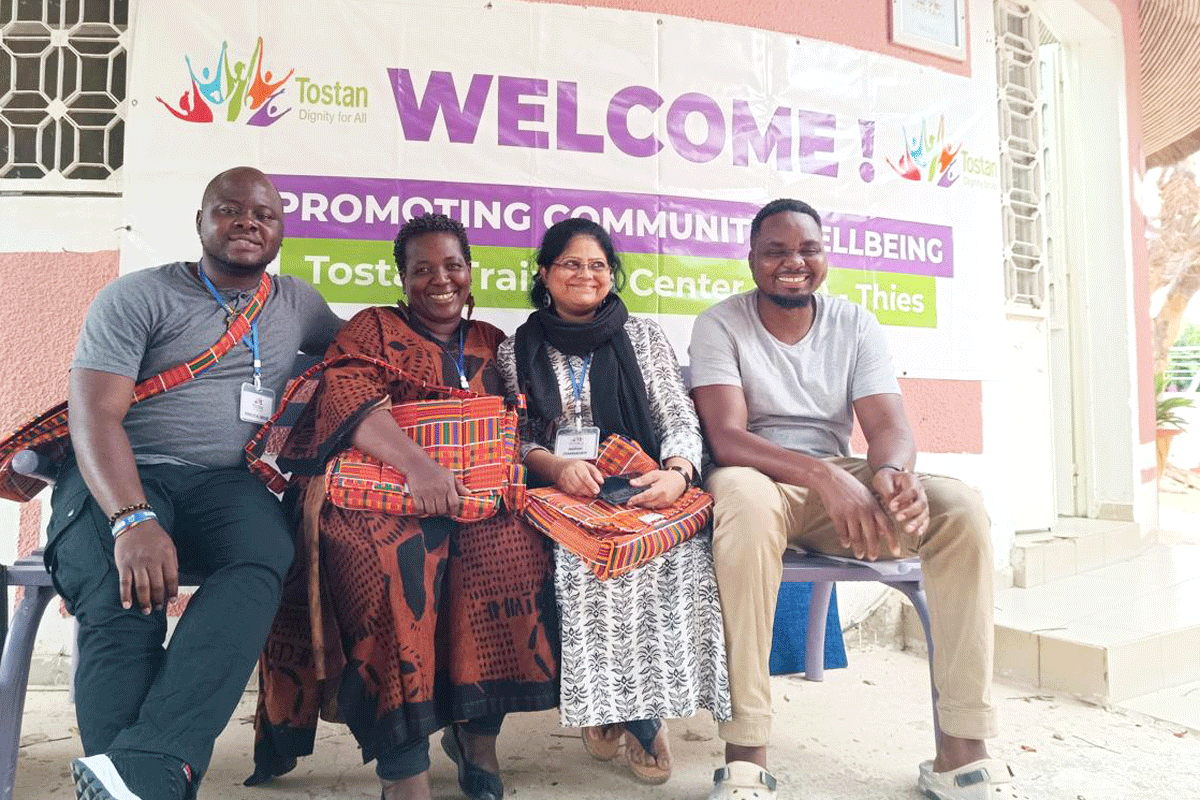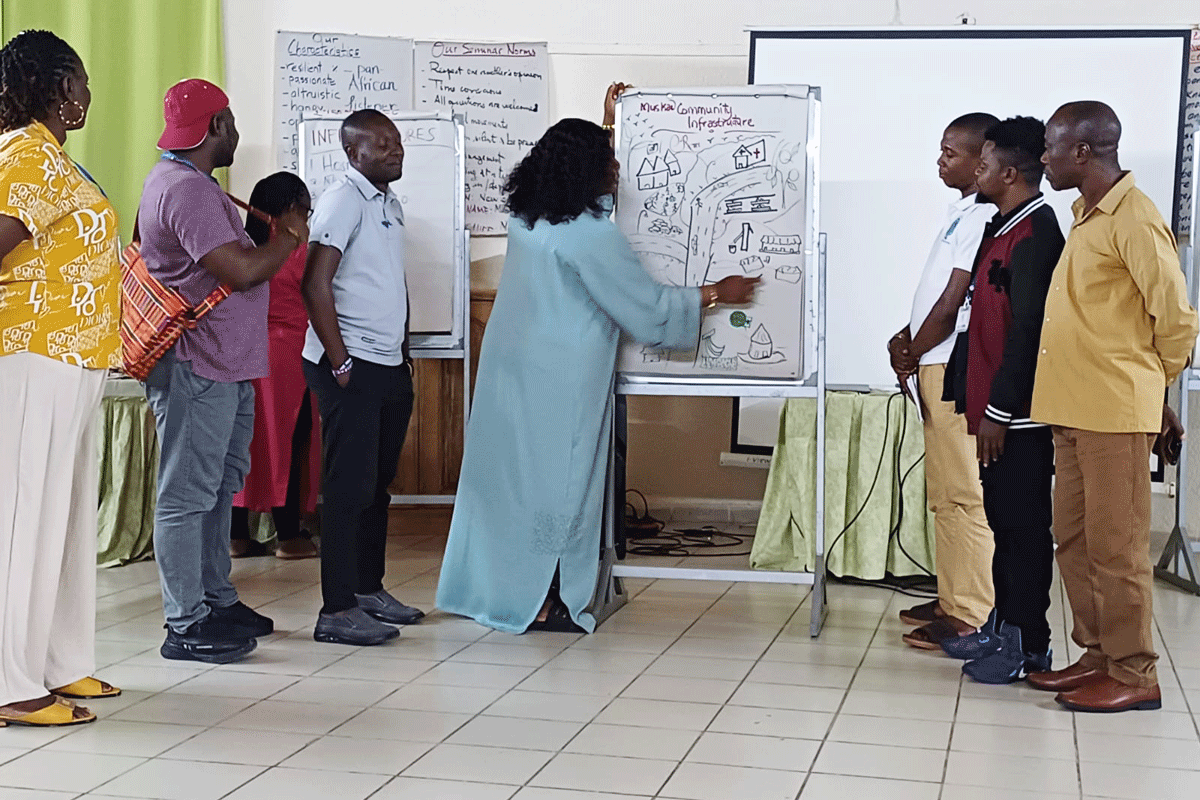
Participar en el Seminario Avanzado de Tostan y aprender sobre su Programa de Empoderamiento Comunitario (CEP) junto con colegas y socios fue una experiencia verdaderamente enriquecedora. El seminario fue organizado y facilitado como una réplica del trabajo de Tostan en comunidades rurales, siguiendo los pasos del enfoque dirigido por la comunidad. Hubo tres temas principales que me parecieron excepcionalmente interesantes.
El primer tema es el poder de fortalecer las relaciones individuales y comunitarias. El CEP de Tostan se basa en el fortalecimiento de las relaciones entre los miembros individuales de la comunidad, las familias y la comunidad entera como una unidad. Esto fomenta el diálogo abierto continuo con los miembros de la comunidad de maneras tan hermosas que los empodera para ser honestos y vulnerables en las discusiones entre ellos. Estas discusiones son fundamentales para crear vías para la construcción de consenso colectivo, que permiten el desarrollo liderado por la comunidad. Como trabajadores del desarrollo, a menudo descuidamos o pasamos por alto este importante paso de fortalecer las relaciones no solo dentro de las comunidades, sino también dentro de las organizaciones con las que nos asociamos. En cambio, nos centramos en fortalecer las relaciones organizacionales, pero no facilitamos procesos para reforzar y fortalecer las relaciones personales desde una base basada en valores.

El segundo tema es el bienestar como marco para el desarrollo. El concepto de centrarse en el bienestar (tanto a nivel personal como comunitario) fue un punto destacado. Esto incluye la idea de permitir interacciones reflexivas sobre cómo cada decisión, actividad, compromiso, proyecto o iniciativa afecta el bienestar de las personas y de comunidades enteras. El verdadero desarrollo liderado por la comunidad se centra en promover el bienestar de todos los miembros de la comunidad, así como el bienestar general de la comunidad, reconociendo que cada individuo desempeña un papel que contribuye al conjunto. Con eso en mente, nuestras iniciativas de desarrollo también deben centrarse en el bienestar, en lugar de centrarse específicamente en los problemas que queremos abordar. También debemos cultivar espacios y prácticas significativas que no dañen el bienestar de las personas, los socios, las organizaciones y las comunidades. Nuestro papel como trabajadores del desarrollo debe ser facilitar espacios donde los miembros de la comunidad reflexionen sobre su comprensión del bienestar y revisar y adoptar prácticas que promuevan el bienestar de cada individuo y de la comunidad en general.
El tema final es la calidad, más que la cantidad, del compromiso. Muchos de los problemas que buscamos abordar a través de nuestro trabajo son complejos y se agravan a lo largo de varias generaciones. Solo se pueden abordar mediante compromisos de calidad, consistentes y basados en valores durante un largo período de tiempo. El cambio no se puede apresurar para lograr resultados. Como alguien que trabaja en desarrollo, he aprendido que el verdadero desarrollo liderado por la comunidad solo es posible a través de compromisos a largo plazo, consistentes y basados en valores concentrados en grupos pequeños en lugar de dirigirse a un gran número de personas o comunidades a la vez. El programa de empoderamiento comunitario de Tostan requiere un mínimo de 3 años antes de que se produzca un cambio social real y cuantificable. Por lo tanto, las organizaciones comunitarias que adopten el CLA deben esforzarse por lograr un compromiso de calidad a largo plazo con las comunidades para impulsar el cambio de manera sostenible. También debemos repensar nuestros procesos de concesión de subvenciones y filantropía para permitir un verdadero desarrollo liderado por la comunidad a través de una financiación flexible y a largo plazo para las organizaciones de base.
El mensaje clave del Seminario Avanzado fue que el desarrollo liderado por la comunidad implica la participación activa y el empoderamiento de los miembros de la comunidad en la configuración de su propio desarrollo, en lugar de una inclusión simbólica. Se trata de un enfoque poderoso que no solo promueve el crecimiento sostenible, sino que también fortalece la propiedad y la resiliencia locales. Juntos, analizamos ejemplos de iniciativas de desarrollo comunitario lideradas por organizaciones internacionales de renombre que no lograron los resultados previstos y reconocimos que una razón importante de estos fracasos fue la falta de comprensión y apreciación de los valores de las comunidades. Esas iniciativas fallidas intentaron cambiar comportamientos sin tener en cuenta los sistemas de valores que los sustentaban.
Nos presentaron la teoría de la reactancia psicológica, que explica cómo reaccionan los individuos cuando su libertad de elección se ve amenazada o restringida. Cuando las personas perciben una amenaza a su autonomía o sensación de control, pueden manifestar reactancia, resistiéndose a la influencia o los cambios que se les imponen. En el contexto del desarrollo dirigido por la comunidad, no reconocer ni respetar los valores comunitarios condenando las prácticas que los sustentan puede desencadenar reactancia psicológica entre los miembros de la comunidad, lo que obstaculiza el éxito de los proyectos de desarrollo.

El seminario destacó que las comunidades son entidades complejas con conjuntos únicos de tradiciones, costumbres, creencias y valores. Estos valores dan forma a su identidad, sus procesos de toma de decisiones y sus comportamientos. El uso de vocabulario, imágenes, metodologías o enfoques degradantes o contundentes que muestren desprecio por las prácticas que defienden los valores comunitarios son formas seguras de hacer que un proyecto fracase. Vocabulario como lucha, batalla, combate, atrasado, incivilizado y bárbaro puede provocar una reactancia psicológica que conduzca al resultado opuesto al previsto.
Lo que aprendí del seminario se puede resumir en la cita de GK Chesterton: “No quites una cerca hasta que entiendas por qué se puso ahí”. Comprender y apreciar los valores de la comunidad es crucial para el éxito del desarrollo liderado por la comunidad. Al reconocer y respetar estos valores, podemos aprovechar la sabiduría colectiva, la autonomía y las aspiraciones de la comunidad, fomentando el crecimiento sostenible, el empoderamiento y un impacto duradero.
Participar en el Seminario Avanzado era algo que realmente necesitaba. Anteriormente había asistido al Seminario Introductorio junto con nuestros socios, que nos dio una idea de la necesidad crítica de cambiar nuestro enfoque del desarrollo y fomentar un cambio duradero dentro de las comunidades. Después de ayudar a nuestros socios a aplicar los aprendizajes clave de ese primer seminario durante los últimos dos años, me di cuenta de que una comprensión más profunda y completa de la lógica detrás del enfoque era esencial para ayudarlos a consolidar y ampliar su trabajo.
A través del Seminario Avanzado, adquirimos una comprensión mucho más profunda y matizada del marco CLA. Esto reforzó la idea de que el desarrollo no consiste simplemente en implementar actividades o brindar servicios, sino en empoderar a las comunidades para que se hagan cargo de dar forma a su propio futuro en función de sus necesidades, valores y aspiraciones. El seminario también proporcionó a los socios y al equipo de GFC recursos prácticos, herramientas y estrategias para seguir desarrollando los resultados positivos que habíamos comenzado a lograr después del primer seminario.

La principal conclusión que he sacado de mi trabajo con una organización que otorga subvenciones es que apoyar a las organizaciones locales va mucho más allá de simplemente proporcionarles subvenciones. Se trata de acompañarlas en su camino, ayudándolas a desaprender prácticas impuestas desde arriba que ya no son relevantes, a deconstruir creencias tradicionales que ya no sirven a sus comunidades y a volver a aprender métodos nuevos que estén más en línea con una filosofía impulsada por la comunidad.
Como parte de la estrategia de GFC para fomentar la colaboración y el aprendizaje interregionales, el equipo de África invitó a su colega Indrani Chakraborty, codirectora regional para el sur de Asia, a unirse a ellos en el seminario. Puede leer sus reflexiones sobre la experiencia y los paralelismos que identifica con el enfoque utilizado en la Iniciativa para abordar las causas fundamentales del sur de Asia. aquí.
El seminario fue cofinanciado y organizado por Tostan, una organización pionera con más de 30 años de experiencia trabajando con comunidades de África Occidental para ayudarlas a hacer realidad sus propias visiones de desarrollo. Se llevó a cabo del 6 al 22 de agosto de 2024 en el Centro de Capacitación de Tostan en Thiès, Senegal, y el equipo de África de GFC participó junto con representantes de organizaciones asociadas en Liberia y Sierra Leona.
